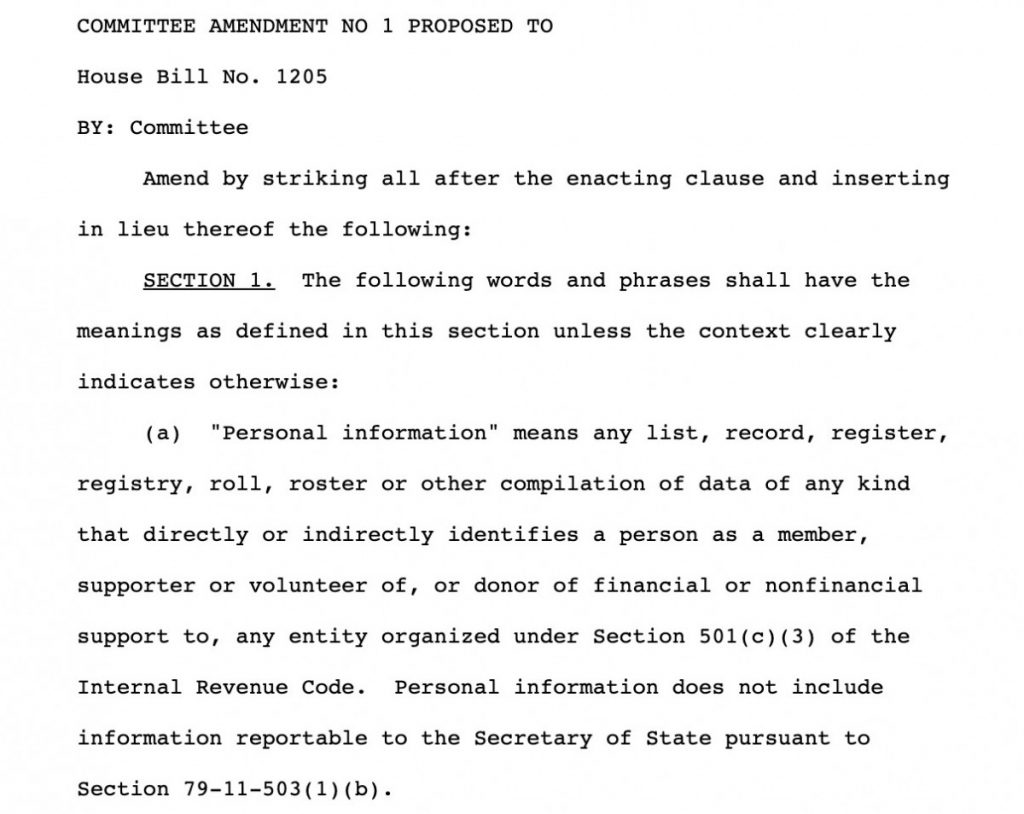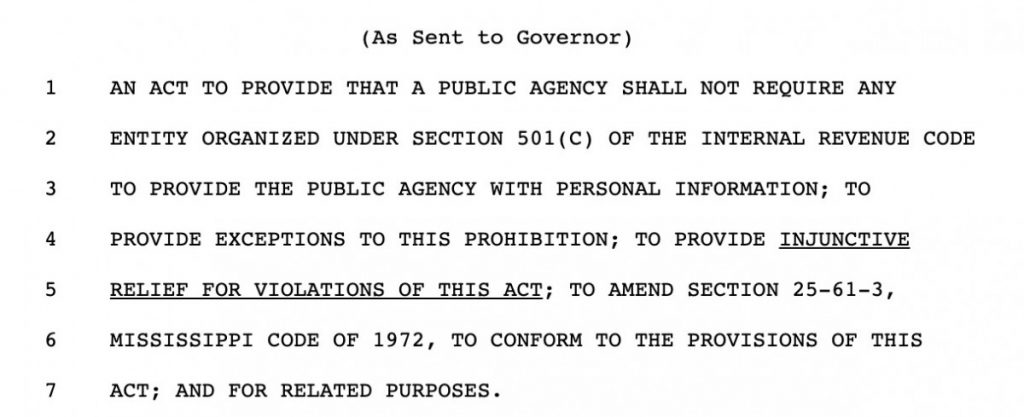A bill that has passed both the House and the Senate is now under scrutiny. The legislation looks to prohibit state agencies from requesting or releasing donor information on all charitable groups organized under section 501 of the federal tax law. The bill (HB 1205) heads to the Governor’s desk where he will either sign it into law or veto the legislation. Senator David Blount explained the difference between 501 (c) organizations saying the bill does not move Mississippi forward, instead it brings about a regression in campaign finance transparency.
“This bill is the biggest step backward in transparency and accountability since the first campaign finance laws were passed two generations ago,” said Blount.
Blount explained the difference between a 501 (c) 3 organization and a 501 (c) 4 organization saying that the 501 (c) 3 organizations are “true” charitable organizations that are not allowed to bring politics into the picture.
Mississippi Center for Public Policy has supported the bill saying it will be a positive change for the state that will allow nonprofits to defend themselves in court if private information regarding their donor list is released. Dr. Jameson Taylor, Vice President of Policy at the Mississippi Center for Public Policy outlines the bill briefly:
“The enemies of free speech and free association are making our political environment toxic by seeking to silence and intimidate anyone who disagrees with them,” said Dr. Jameson Taylor, vice president for policy with MCPP. “In Montana, the governor is going after businesses who donate to trade associations like the U.S. Chamber of Commerce. In California, then-AG Kamala Harris made it a priority to obtain the donor lists of conservative groups like Americans for Prosperity. At the federal level, Nancy Pelosi and the Democrat-majority House have passed H.R. 1, which would destroy donor privacy and politicize the federal contracting process. Unfortunately, these tactics are not new. They were used by government officials in the 1950s in an effort to destroy the NAACP. They are being used today to bully and harass donors who give to nonprofit organizations.”
Taylor adds that the bill does nothing to change campaign finance laws and does nothing in terms of what the Secretary of State does in its auditing function of nonprofit organizations.
“The bill just does one very simple thing,” said Taylor. “It allows a nonprofit to defend itself in court if a rogue government employee or government agency releases the private information of that nonprofit for the public to see.”
Taylor said they want to have these protections in place before anything happens. All it takes he says is one rogue employee.
“As a nonprofit, you have to report at least some of your donations on government forms, so they have a copy of that and when you file your taxes you might say who you donated money to,” said Taylor. “That information is available, but it’s private. The IRS has it, but they are not supposed to release it.”
According to the Mississippi Center for Public Policy, statewide polling shows 81 percent of Mississippi voters support legislation that would protect the personal information of individuals who donate to the causes and charities of their choice. HB 1205 would do that by making it a crime for the government to release the personal information of any person who gives to an entity organized under Section 501(c) of the Internal Revenue Code. The tax code recognizes 29 different “c” groups, all of which are nonprofits. These include: charitable nonprofits, like churches and domestic violence shelters; trade and agricultural associations; labor unions; and veterans’ groups.
“This is a very real threat that is occurring in other states,” said Taylor. “I am thrilled that the state of Mississippi has an opportunity to take the lead and say that we are going to allow our nonprofits to defend themselves in court if someone should try to destroy their organization by releasing their donor list. It’s a very simple bill.”
Blount reiterated that the bill has been sold to the people as helping charitable organizations when instead it provides cover for political advocacy groups.
“The reason that this bill is before the legislature is not about charities,” said Blount. “It is not about 501 (c) 3s it is about 501 (c) 4s which are not charities. They are separate organizations defined by the Internal Revenue Code as Advocacy Organizations and they play politics.”
Blount said that no one wants information on who and how much people are giving to their church. However, the same should not apply to groups who are looking to influence elections and voters.
“They need to tell the people of Mississippi where the money is coming from,” said Blount. “This bill will change all of our campaign finance laws as it relates to political committees and outside political activity.”
Examples of 501 (c) 4 organizations range from right-wing groups like American’s for Prosperity, to liberal organizations such as Planned Parenthood.
“It could be any kind of group left, right, or center, that is funded by outside money that wants to elect a particular candidate, defeat a particular candidate, promote a particular issue on the ballot,” said Blount. “If there is an amendment to the constitution on the ballot and they are for it or they are against it, none of that money is disclosed. If they want to elect somebody and talk about how great he or she is, none of that money is disclosed. If they want to tear somebody down, they can talk about how terrible somebody is, they can do that and none of that money is disclosed. They are a 501(c) 4, not a 501 (c) 3. They are a 501 (c) 4 organization.”
In Mississippi, donors are allowed to give any amount of money to a candidate or a Political Action Committee (PAC) as long as the money has been reported. However, things are different at the federal level. Donors are not allowed to give above a certain amount and instead, they will give money to 501 (c) 4 organizations who are then able to use the money either in support of or against a candidate.
“If you’re for Tate Reeves, or Bill Waller, or Jim Hood, or whoever, just give your money to the candidate, give them as much money as you want,” said Blount. “The candidate will report it, the public can go look at that report and see what’s what. The federal side got into this mess because people are limited and they don’t want to disclose. We don’t need to start doing that in Mississippi. We need to do it the way both parties have always agreed that we are going to do it which is no limits and just disclose. This will change all of that.”
“This will change everything about the way campaign finance disclosure works in Mississippi because these are not charities,” said Blount. “These are not 501 (c) 3s which nobody has a problem with, these are 501 (c) 4s that are doing this at the federal level and they want to keep it a secret here in Mississippi at the state level.”
Blount added that when the bill went through the Senate committee, they amended the legislation to specify that it would ONLY apply to 501 (c) 3 organizations. However, when the bill came up on the floor another Senator amended it so that it would include ALL 501 (c) organizations.
“I know in the Senate and I am sure in the public people don’t know exactly what these differences are between a charity and a 501 (c) 4 and I think the public is just now catching on to what is going on here,” said Blount.
He went on to say that the people have a right to know where money is going and who is donating it to the groups that support candidates or political opinions.
“You give the money to the 501 (c) 4, the 501 (c) 4 does the direct mail, buys the television commercial, whatever it is, and you are not on my campaign finance report, and yet the voters are seeing television commercials, or getting direct mail, or hearing radio ads about how great or how terrible I am and they don’t ever know where the money came from. We just need disclosure in our political campaigns.”
Blount says he has called upon Governor Bryant to veto the legislation and is hopeful that he will do so as he has a strong record on open and transparent government.
“HB 1205 has been sent to Governor Bryant. He will carefully review it before making a decision,” said Rivers Ormon, Press Secretary for Governor Phil Bryant.






